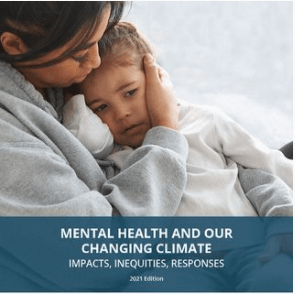Community Hubs
This post is part of a Mental Health Awareness Month blog series that highlights “Closer Look” perspectives from the 2021 edition of Mental Health and Our Changing Climate. This is a reprint from the report.
Community Hubs

Climate change will yield enormous emotional damage, which translates to widespread suffering, impaired health, frayed social fabric, mutual support, and collective purpose. We have to figure out how to approach mental health needs in ways that strengthen communities as sources of wellbeing and sources of empowered, connected civic action to solve problems — like responding and adapting to climate change. What’s needed to equip communities to be mental health engines?
Merge two things we know about: First, a “homebase” that can network, recruit, and support a range of community-based organizations and trusted anchor institutions, especially those addressing intersectional drivers such as precarious housing, racism, economic unfairness, and environmental vulnerability. Community hubs, where public goods can be clustered under a shared, accessible, neighborhood-familiar place, fit that description. This model has been widely applied. For example, community schools are neighborhood connectors for a range of services, and they support high-adversity facing students and families.
Second, a global, growing, evidence base of skills for non-specialists to perform a wide range of the mental health work these hubs adopt. Clinicians can step up to coach their skills, serve as back up for further care, and support overall quality. REACH NOLA, where outreach workers identified and counseled neighbors with depression in New Orleans after Hurricane Katrina as part of community-led recovery efforts, reflects this approach. But as the New York City initiative, ThriveNYC, showed, a much wider menu of proven skills, including promoting and strengthening mental health and wellbeing, can reach massive scale in an array of people’s hands, across dozens of approaches, at the same time.
Combined, hubs and dispersed skills, are a flexible template for the needed reach, scale, and scope of action for neighborhoods to safeguard and rely on collective strength and wellbeing in the face of escalating environmental challenges.
This core idea is getting traction along many paths, whether adopting a preventive trauma-resilience paradigm, care and symptoms focus, comprehensive menu of prevention/promotion building blocks for nurturant communities, or community-wide emotional strength-building. But intentional policies, political will, and funding streams are urgently needed for growing the infrastructure that can support all the above, and more.
Community hub docking stations can do that: align local groups around priority population-wide aims, and connect them with “anchor” partners for support. COVID-19 underscores what happens without robust civic-led participation to face our biggest problems. But the pandemic is just a mild warm-up and a warning for the massive demands climate change will have on the social fabric.
Read the report, HERE. And share on Social!
About ecoAmerica
ecoAmerica builds institutional leadership, public support, and political resolve for climate solutions in the United States. We help national mainstream organizations elevate their climate leadership, providing them strategy, tools and resources to: demonstrate visible climate leadership, empower climate literacy, engage all constituents, and build collective action and advocacy. We help our partners transform into national climate leaders who inspire others on solutions. ecoAmerica.org
Want the convenience of getting ecoAmerica’s newsletter and blog in your inbox? Subscribe today!
Join ecoAmerica in the call for more ambitious and just climate action. Sign the MomentUs statement today.
